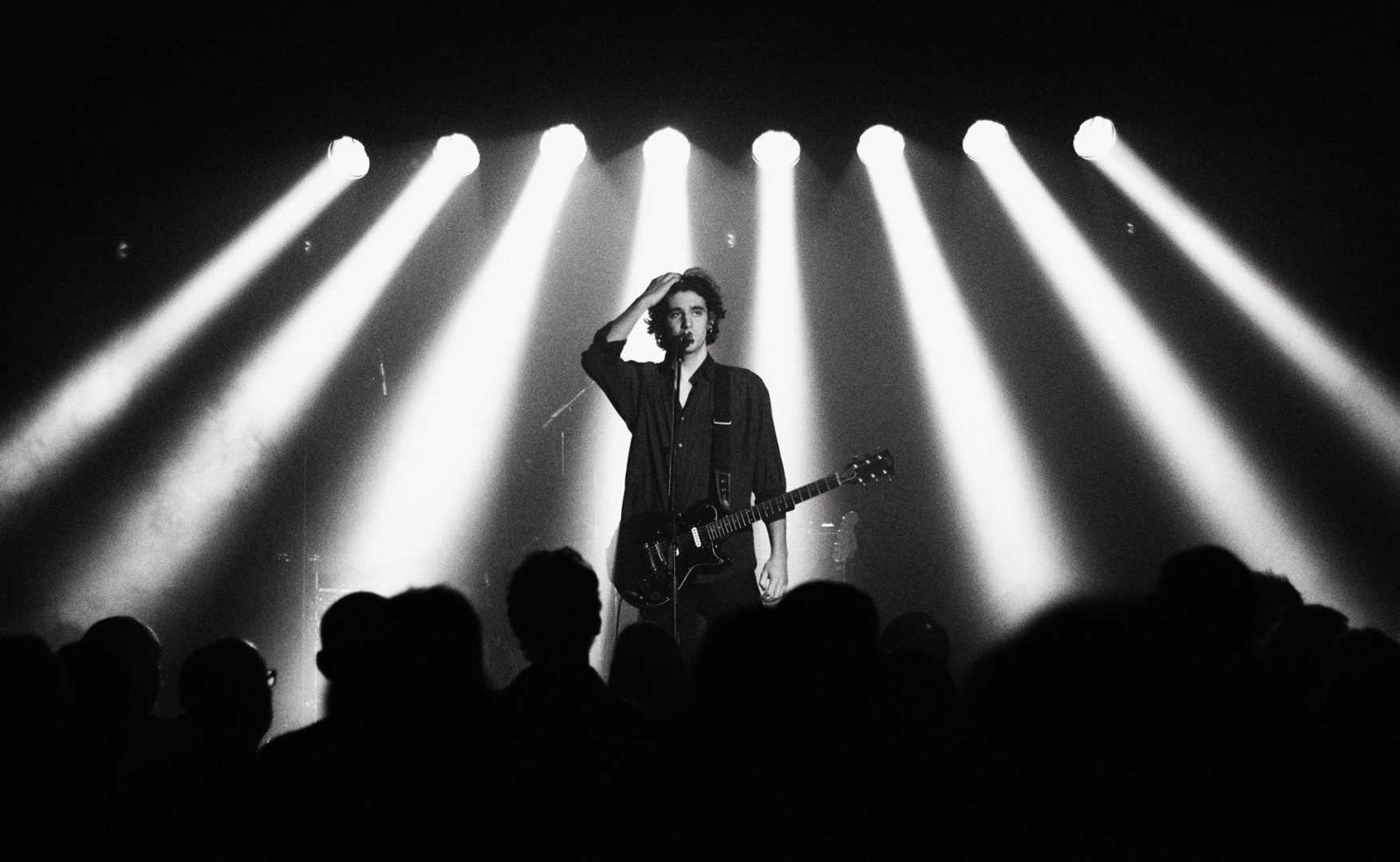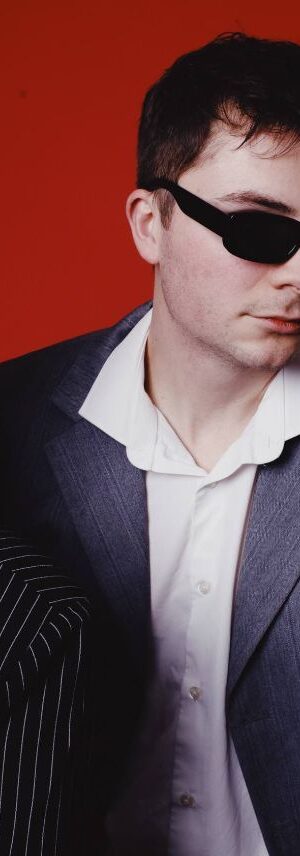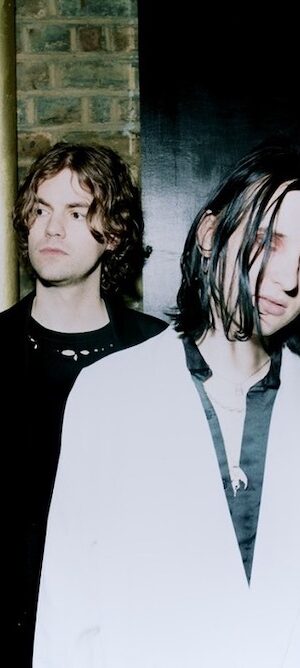TMR TALKS TO...
TAMINO
Tamino’s music reflects the voice of a generation who are searching for deeper meaning in a world that often appears artificial and cold. Over the past year, this Belgian-Egyptian songwriter has reached down into the deepest crevasses of his soul to convey what some may mistake for an old soul, but really it’s an honest portrayal of being a young person, of experiencing things for the first time, of dealing with emotions. The result is the Habibi EP, and you may recall our recent List Pick of EP single ‘Sun May Shine’, one that shows his “growth into a musician to stand the test of time, holding onto his ageless songwriting, while embracing contemporary textures”. We had the pleasure of meeting Tamino at The Great Escape festival, and over the course of our conversation, we discussed playing live shows; the importance of lyrics; influences from books, art, and music; growing up in a family of creatives; feeling like an outsider; and the upcoming album. *** TMR: You recently played in London, how was the show? Amazing! Absolutely fantastic. It sold out, which was a very pleasant surprise and the audience was incredible. I actually was very scared, because I’m not a native speaker. I find my lyrics very important and to play in a place where everybody is really listening to your lyrics is intense, but the reaction was amazing, so it couldn’t have been any better. TMR: How does it compare playing in the UK to playing in the Netherlands or Belgium? For me especially, the difference is in the lyrics and the perception of them. In Belgium or the Netherlands, I don’t think many people are really listening to the lyrics, people are just listening to the music, and the emotion, and the atmosphere. They will sing along, but just because they know the words, but they will not… I don’t know, there really is a difference there. TMR: I suppose most English speakers will be able to interpret the deeper meanings of your word choices. It may be more immediate, and that’s really cool because then I have the feeling that when I’m singing my song, it’s at that moment, maybe there’s someone who’s listening for the first time and it’s already doing something in their head. TMR: Where’s the most surprising place your music has reached? Definitely Turkey. We were doing two sold out shows there in a week. I’ve never been there, I don’t know how it happened, it just happened. TMR: Do you think it’s because your music has quite a lot of Arabic influences in it? Perhaps they’ve been able to connect with something that’s both western and Arabic? Maybe, but I do think that Turkish music is different from the music that I’ve grown up with. I actually think it has more to do with the young people there looking for music; they’re very keen to interact with everything that’s going on culturally around the world. It’s also maybe a kind of rebellion against their government and all that’s happening in their country. I don’t have any explanation why I would be any more popular over there than anybody else, but it’s very pleasant. TMR: You say they want to engage more, possibly with music that has more meaning, and your songs are stories in a way. Did you find inspiration in books, or films, or poetry? Definitely. A lot of books. I love to read and I love movies as well, but I feel like when I’m reading it penetrates the soul a bit more. A good book can really change you, I think. For the album that I’ve been making for the past couple of months, Kahlil Gibran was a very big influence on me. He wrote A Prophet, it’s a little book, with all kinds of wisdom in there. Every chapter is like - love, work, marriage - on every kind of aspect of human life, he has something to say. I think it’s very interesting. He also has a kind of romance to him, but also rebellion. He uses romance as rebellion against a cold world, actually. TMR: Is that something you feel that you’ve done through some of your songs? I hope that I’ve done it a bit, yeah. I can imagine that if you hear a song like ‘Habibi’, it’s an older song of mine, but you might think “what, this guy must be really romantic, he must have his head in the clouds all the time,” but it’s not really like that. I can be, but I can also be very nihilistic and apathetic too. It was a conscious decision to make a very romantic song, maybe as a rebellion to what I find be a cold world, but also as a rebellion to myself, because I’m often looking in a cold, nihilistic way to what’s around me. TMR: Your music is quite dark, but not in a bad way, in a way that shows you’re not afraid to approach those subjects like death and mortality, such as in ‘Cigar’. That was the first song I heard from you, and so I was wondering, what inspired that song for you? Was it someone like an author or was it closer to home? It was definitely mortality, like you said. It was something that was in my head a lot of the time… it still is, but then I saw it reflected in a painting by Van Gogh when I went to the museum in Amsterdam when I was living there. It’s a small painting of a skull, and he’s smoking. It was a cigarette, although I thought it was a cigar. I just saw a figure who was very at peace with his life, and was thinking back with his cigar and he didn’t have any regrets. It was a very funny painting, and for me, it was really cool to see because I was really struggling with a lot of things. In my head, he looked happy, even if he had an early death, he would have done it all the same if he got another chance at living. That contrast inspired those first lines and it definitely inspired the video for the song. TMR: Of course, you had the skeleton puppet in the video! Yeah, I wanted him in the main role. TMR: And you brought him back to life… … For one night. That was the concept, that he would live one night and do all the bad shit he’d done in his life. He smokes a lot, he pisses in public, he goes to a brothel, where he meets the madame and they know each other from before, and she’s like “oh hey!”, and they start dancing, but she remembers “you’ve done me harm”, and pushes him away. Then he steals a car, and he’s off! Then he dies when the sun is up again. For me that song is definitely dark, but it’s got some humor in there too. TMR: You said there that you’ve struggled with emotion, and that’s something that really comes through your music, for example with ‘Indigo Night’, there’s loneliness and bittersweet hope. Is that something you felt at the time of writing the song? Oh yeah, definitely, it’s really a very narrative song. When I wrote it, I thought “is that really me to write a song like this?”, because I’d never done that before, creating a character, to not really have the “I” in there, and from another point of view. What I felt inspired the song and the character is the idea of this boy who sees a lot of beautiful places, but he’s completely detached from it. I had an experience, I was just talking about it yesterday, it was a drug experience - a good one - where it just showed me how I could feel in a bad time, so kind of the same thing with this boy who meets these girls, and it’s not in a sexual way at all, it’s just they have fun with him and they show him around or they sing… it’s up to everyone’s interpretation. It gives him hope again, he’s been detached from everything, but now a little door has opened and there’s some kind of way for him to participate in everything. TMR: He’s very much a character of an outsider and I think that’s a repeated character trait throughout your songs. Would you say that you’ve felt like an outsider? Yeah, nothing that I was really sad about, but it’s always been there. I have a mixed background, I’m partly Egyptian, partly Belgian, partly Lebanese even. I’ve never really felt at home anywhere. It’s definitely an influence on my work. TMR: One thing I suppose you could find a place in is family; your grandfather was a musician as well, so how much has he influenced your work? Actually, just a bit more than any artist. I really look up to him and I love his music, but I haven’t grown up with him. I knew him, but I don’t remember any of it. It’s always been kind of a mind fuck growing up in Belgium and knowing that he was my grandfather, he was this big star somewhere else, and if I had lived there my life would have been completely different. In a musical sense, I really love Arabic music: the atmosphere, the emotion in there, the scales they use, the instruments, the arrangements, everything. In a different way, it was another kind of influence… I never questioned music, because he was there. I never questioned being attracted towards art and music because it was very logical. It felt like it was destined actually. I can’t imagine someone growing up with parents or family who have no musical background, or any background in art, and you feel very passionate about music, then you might question yourself. “Is this really me? Am I really destined for this?”, I’ve heard it from other people that they really had to fight those doubts, all their life. I don’t really have that, I knew from a very young age that this is what I was going to do and that it was going to happen. You know, I didn’t expect to make money out of it, I didn’t expect to have an audience, none of those things I take for granted, but I knew my purpose. TMR: Do you think growing up somewhere like Antwerp has helped foster that attraction towards music as a career, because it’s a very creative city? It is definitely. It’s a very creative city, there’s art galleries everywhere, but I also think my mother was a very big influence on that. She did art as a profession and she never talked like “when you grow up, you have to make money,” I don’t remember any of that. The only thing that was ever said is “follow your heart”. That has really formed me. Antwerp as a city is amazing, but I can imagine London also being very inspirational, but there’s more going on, you might feel more of a sense of competition. I’ve never had that, I never felt like music was a competition, but I now do notice that with signing to an English label - and I love the guys at Communion - the mindset is a bit more competitive. In Antwerp, you don’t have that, you might have a bit more freedom to just create your work, you’re not influenced by trying to be the best. TMR: You’re allowed to create your own style, rather than trying to fill a niche. You mentioned your mother there, and I read that you were introduced to a lot of artists through her record collection. Can you name some of your favourite records? Yeah, yeah, yeah! Chopin, she played a lot of Chopin. Tom Waits, she adores him. The Beatles, Fairuz, a Lebanese singer, and John Lennon’s solo records. Those were the ones that stuck with me, for some reason I was obsessed with John Lennon when I was younger. The best ones are Imagine and Plastic Ono Band. Those albums are amazing. I was very intrigued by him. TMR: Do you listen to much contemporary music? I love James Blake, Sampha, King Krule, Björk, FKA twigs - they are all amazing. TMR: Speaking of James Blake, when I listened to your newest single ‘Sun May Shine’, I was thinking that it has a little bit of a James Blake influence there, as it’s more electronic leaning. Is that a progression in your sound or is that something you just wanted to try for one single? It will always depend on the song. I can already say that in the other songs we’ve produced, that the electronic elements are there. I don’t look at it as a genre, it’s just sound, whatever fits the song the best. TMR: Do you think having the electronic elements and the sound from your previous tracks in ‘Sun May Shine’ helps to reflect the duality of the character? Yeah! I’ve never thought about it that way. It’s funny because an acoustic element is always warmer, whereas electronic is immediately more cold, less human. Yeah, it’s very interesting what you said, because by combining the two, you combine those two worlds. I mean, I’m not the first to do it. Radiohead is of course the revolutionary band that started doing that, I’d say, with Kid A. That album is very inspirational. TMR: One thing I do want to know as a long term fan, is ‘Reverse’ coming back? On the album? No it’s not, but I actually hope that the old EP will be up again, but it might bring about too much confusion. I do love the song, we still do play it live. TMR: Will you play it live tonight? Yeah, I think we will. TMR: You’ve actually mentioned your album a few times. What can a listener expect from the album? Thematically, the duality between the romanticism and the nihilism. I think it’s also a very young album, some like to say that I have an old soul, but I don’t agree with that. I talk about the same things as other young people, but maybe in a different way. It’s about experiencing things for the first time and the same fears. I’d say it’s a synthesis of my experiences in the last year. I’m very proud of it. TMR: Finally, what else do you have planned for this year? This year… I’ll do a lot of festivals, a lot of shows, but I really just want to finish the album right now. I’m actually really looking forward to writing new music, I’m in need of that. -Hannah Thacker
Listen



